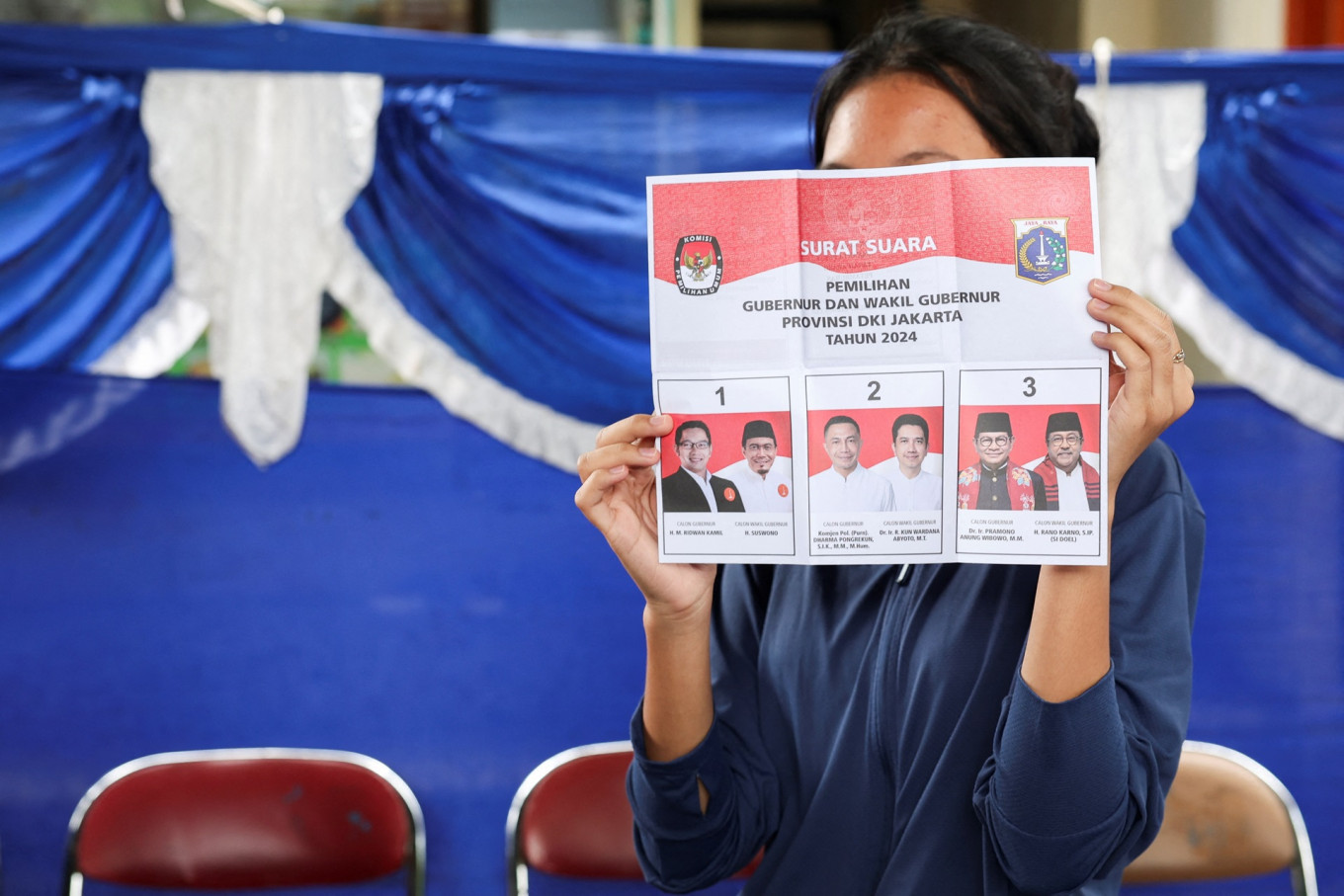Popular Reads
Top Results
Can't find what you're looking for?
View all search resultsPopular Reads
Top Results
Can't find what you're looking for?
View all search resultsJakarta, the crucial battleground for democracy
The results of Jakarta's gubernatorial race indicate that the city is more than a mere outlier in this year's regional head elections: It stands as a bastion of democracy, built by its politically aware electorate on its historical foundation as the center of civil movements.
Change text size
Gift Premium Articles
to Anyone
I
ndonesia’s 2024 regional head elections have revealed the overwhelming dominance of the Onward Indonesia Coalition (KIM) Plus, which secured victories in several strategic provinces, including Banten, West Java, Central Java, East Java and North Sumatra.
Armed with substantial financial resources and a range of voter mobilization strategies, from social assistance programs to allegedly involving civil servants and the police, the ruling coalition has sought to shape voter sentiment. However, Jakarta, long regarded as the epicenter of democracy, has exhibited remarkable resilience against these manipulative practices.
The demographics of Jakarta's electorate, characterized by a generally high level of political awareness and the city’s historical role as a center for reform and pro-democracy movements, played a crucial role in countering political maneuvers aimed at silencing the voices of the populace.
Jakarta has become a battleground where public policies are met with sharp criticism from various societal factions, including intellectuals, students, NGOs, civic organizations, independent research institutions, the media and artists. Consequently, Jakarta is not easily swayed by the machinations of those in power.
Nevertheless, the electoral process, which should ideally be conducted with legality and transparency, faces serious challenges.
KIM Plus attempted to delegitimize the city’s gubernatorial election by accusing the Jakarta Elections Commission (KPUD) of inadequate socialization that led to low public participation. Despite this claim, strong resistance emerged from civil society and individual voters, particularly on social media, which serves as a platform for expressing dissatisfaction.
KPUD Jakarta, which was under scrutiny in the recent elections, faces significant challenges related to declining voter participation.
Participation reached 70 percent in the 2017 gubernatorial election, but in the 2024 simultaneous regional elections, this figure plummeted to 58 percent, the lowest in history. This decline should be interpreted as an indicator of public dissatisfaction with existing political parties and the political system, rather than solely as a failure of the KPUD: It reflects a growing number of protest voters who feel that their aspirations are unrepresented.
KPUD Jakarta has a responsibility to ensure that the electoral process runs smoothly, but it grapples with various challenges including logistical issues, transparency and public trust. Allegations against KPUD Jakarta over the distribution of voter invitations often distract from political parties’ failure to communicate effectively with their constituents.
In this context, the decline in voter participation is more an expression of dissatisfaction with the existing political parties, particularly those aligned with the ruling powers.
David F. Damore (2002) posits that protest voters emerge from public dissatisfaction with the political system. In Jakarta, this discontent is reflected in voters increasingly gravitating toward unconventional candidates or parties. Many political parties in Jakarta have failed to grasp and respond to the needs of the public, leaving voters feeling unrepresented.
Weaknesses in public communication, a crisis of trust and a lack of public engagement in decision-making are primary factors contributing to the decline in voter participation. Furthermore, electoral fraud, including the involvement of state institutions and power manipulation, exacerbates the situation. Jakarta’s politically literate populace is acutely aware of attempts by the ruling coalition to obstruct the candidacy of those perceived as threats to their power.
Structured and systemic fraud within the electoral process that involves the manipulation of results through the abuse of power has engendered profound disappointment among voters. This frustration has not only accumulated as dissatisfaction, but also sparked robust protest movements on social media.
The public and pro-democracy activists have mobilized citizen journalism, which has emerged in response to electoral malfeasance, to challenge the oligarchy. By leveraging digital platforms, they actively voice their grievances, expose corrupt practices and contest the narratives constructed by the political elite.
Citizen journalism serves as a tool to empower the public, enabling them to express their views directly and become active participants in the political process. In this context, social media functions not merely as an information channel but also as an ideological battleground, where citizens can resist the dominance of an oligarchy attempting to control the public narrative. Pro-democracy activists use these platforms to organize campaigns, disseminate information and rally support for candidates deemed more representative and transparent.
The refusal of the Ridwan Kamil-Siswono campaign team to endorse KPUD Jakarta's tabulation results indicates an effort to delegitimize the election outcomes. The lawsuit it has filed against the commission over low voter participation appears to be an attempt to obstruct the ratification of the election results, despite the absence of significant evidence of fraud.
In this context, it is imperative for civil society to view the Jakarta election as more than just a gubernatorial contest. The city must be understood to be the last bastion of democracy in Indonesia, where using unethical means to mobilize votes is no longer effective. The efforts to blame KPUD Jakarta for the low voter turnout should serve as an opportunity to reflect for political parties, particularly those in KIM Plus, and mend their relationship with constituents.
Ultimately, the Jakarta race is not merely a routine electoral exercise, but a symbol of the struggle for democracy. The public must advocate to ensure that the election’s results are legitimate and reflect the will of the people, while rejecting any form of fraud that undermines the democratic system.
Jakarta, as a political and social hub, must remain the last bastion for democracy in Indonesia.
---
The writer is a public policy analyst and crisis management adviser who has a Master of Politics and Policy from Deakin University in Australia.











